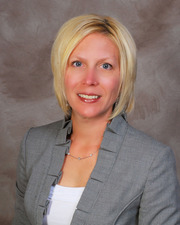Spotlight, May 2014

In IU’s School of Public Health (SPH), students often have the opportunity to practice in professional settings what they are learning in a course. So it comes as no surprise to find students in the Department of Kinesiology working in other settings with IU athletes and patients who have suffered injuries and need therapeutic exercise to regain their strength before they return to play/activity.
According to Joanne Klossner, who teaches Principles and Techniques of Therapeutic Exercise, requiring students to work with patients is one of the best ways for them to apply theories they have read and discussed in class to the practice they will eventually engage in as athletic trainers. That’s why she intentionally designed her course so that students would have an experience that would prepare them for the day they will become licensed athletic trainers. But she realized that such practical learning experiences would be more meaningful to students if they were connected to authentic assessments.
Authentic assessments ask students to accomplish tasks and make the mental moves that are similar to those an expert in a given discipline would make (Wiggins, 1998). As an additional benefit, authentic assessments allow the teacher to judge how well students are achieving the course learning outcomes.
In Klossner’s class, students are required to conduct a case study project about an injured patient that they treated during clinical education. The project requires students to examine the research literature related to their patient’s condition, decide on a clinical regimen, implement the treatment, determine its overall efficacy, and make recommendations to other practitioners for future clinical practice based upon their analysis.
As a final project in the course, students create a scientific poster, sharing the results of their case study with other students during an end-of-semester public poster session. Local athletic trainers, SPH faculty and staff, and faculty from across campus are also invited to the poster session, where they provide feedback and guidance to the students about the success of their projects.
According to Klossner, the poster session is the final and most meaningful step in helping students bridge the gap between theory and practice, as they prepare for a future in athletic training.
The short clips below show what Klossner’s students have to say about the usefulness of this process:
Joanne Klossner is a Clinical Associate Professor in the Department of Kinesiology, School of Public Health.
Who Else Is Doing This at IUB
Professor Joshua Danish, in the School of Education, asks his students to apply the cognitive theories they have learned in class to help them interpret children’s behaviors in the classrooms they are observing, in this faculty spotlight.
Professor Alwiya Omar, Clinical Professor of Linguistics and director of IUB’s Swahili Flagship Program, has her students learn Swahili by engaging in an activity with strong roots in African languages and cultures: storytelling. She describes her approach in this faculty spotlight.
References:
Wiggins, Grant. (1998). Ensuring authentic performance. Chapter 2 in Educative Assessment: Designing Assessments to Inform and Improve Student Performance. San Francisco: Jossey-Bass, pp. 21 – 42.

